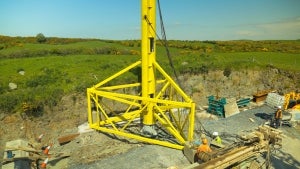
McLaughlin & Harvey and SeaRoc have successfully formed a new team to deliver their project to demonstrate a novel foundation system in a tidal stream site, using rock anchor drilling technology.
The companies are working in partnership to deliver a mooring system for the SR2000 floating tidal turbine, which will be deployed at the European Marine Energy Centre (EMEC) tidal test site this year.
McLaughlin & Harvey, with support from SeaRoc, has secured approximately £1m of funding through a collaborative grant arrangement with the Carbon Trust, under the Scottish Government’s Marine Renewables Commercialisation Fund (MRCF), and Invest Northern Ireland. On completion, McLaughlin & Harvey will have fully demonstrated their remotely operated seabed drilling technology which has been part of an ongoing R&D programme.
SeaRoc has used its knowledge and experience to develop a marine operations strategy which uses existing and cost-effective marine equipment to provide a platform at sea from which McLaughlin & Harvey can deploy their equipment and carry out their drilling works in a safe and efficient manner. The project partners will each make a contribution in-kind towards financing the project and Scotrenewables Tidal Power Ltd., developers of the SR2000 tidal turbine, will contribute over £450,000 in cash.
McLaughlin & Harvey marine renewables manager Adam Holland: "We are very excited about this project, which has been part of our ongoing in-house R&D programme for a number of years. Our goal here is to demonstrate a step change reduction in the cost of marine renewable energy installations using conventional, civil engineering techniques to deliver foundations in a novel application."
SeaRoc head of wave and tidal projects Nick Murphy: "It is great to be part of this team, which brings together our complementary skills to deliver an integrated design for marine energy projects. We are really pleased that we could find a project which delivers the various interests of so many organisations so well".
Energy minister Fergus Ewing commented: "I am very pleased that we are able to assist in the development of this novel foundation system through our marine renewables commercialisation fund, which will be used with Orkney-based Scotrenewables’ SR2000 tidal turbine. This system will be tested at the European Marine Energy Centre (EMEC) in Orkney, the world’s only accredited testing facility for wave and tidal energy prototypes. There is no doubt that harnessing the power of our seas is challenging, more so than we ever envisaged.
"However, the Scottish Government remains committed to building a successful marine industry in Scotland. The McLaughlin & Harvey and SeaRoc project is a perfect example of Government and industry working collaboratively and across borders to develop innovative new concepts that will play a crucial part of cost reduction in the first array projects."
Scotrenewables Tidal Power chairman Barry Johnston commented: "McLaughlin & Harvey’s and SeaRoc’s experience of delivering complex, international tidal energy projects really boosts the strengths of our existing team. The SR2000 project gives a perfect opportunity to trial rock bolt anchors in a real-life tidal energy site and we are very happy to facilitate this as we recognise the long-term potential for cost reduction which this technology can bring to the tidal sector."
Carbon Trust’s Innovation Scotland director Andrew Lever commented: "The drilled rock anchor project aims to significantly reduce the foundation and installation costs for marine renewable devices, which collectively account for over 40% of CAPEX. We are pleased to be working with the McLaughlin & Harvey consortium, who have shown great commitment and enthusiasm for the project to date, and we look forwards to successful project delivery going forwards."
Invest NI’s director of research and development Carol Keery commented: "McLaughlin and Harvey has built up significant expertise in the marine sector and this installation technology for turbines has the potential to open up a significant range of opportunities for the business. Our R&D grant support encouraged this inter-company and cross-border enterprise to engage in collaborative testing and I would encourage other companies to explore how similar collaborative projects could help drive forward their business growth."
Please feel free to contact SeaRoc for more information.

